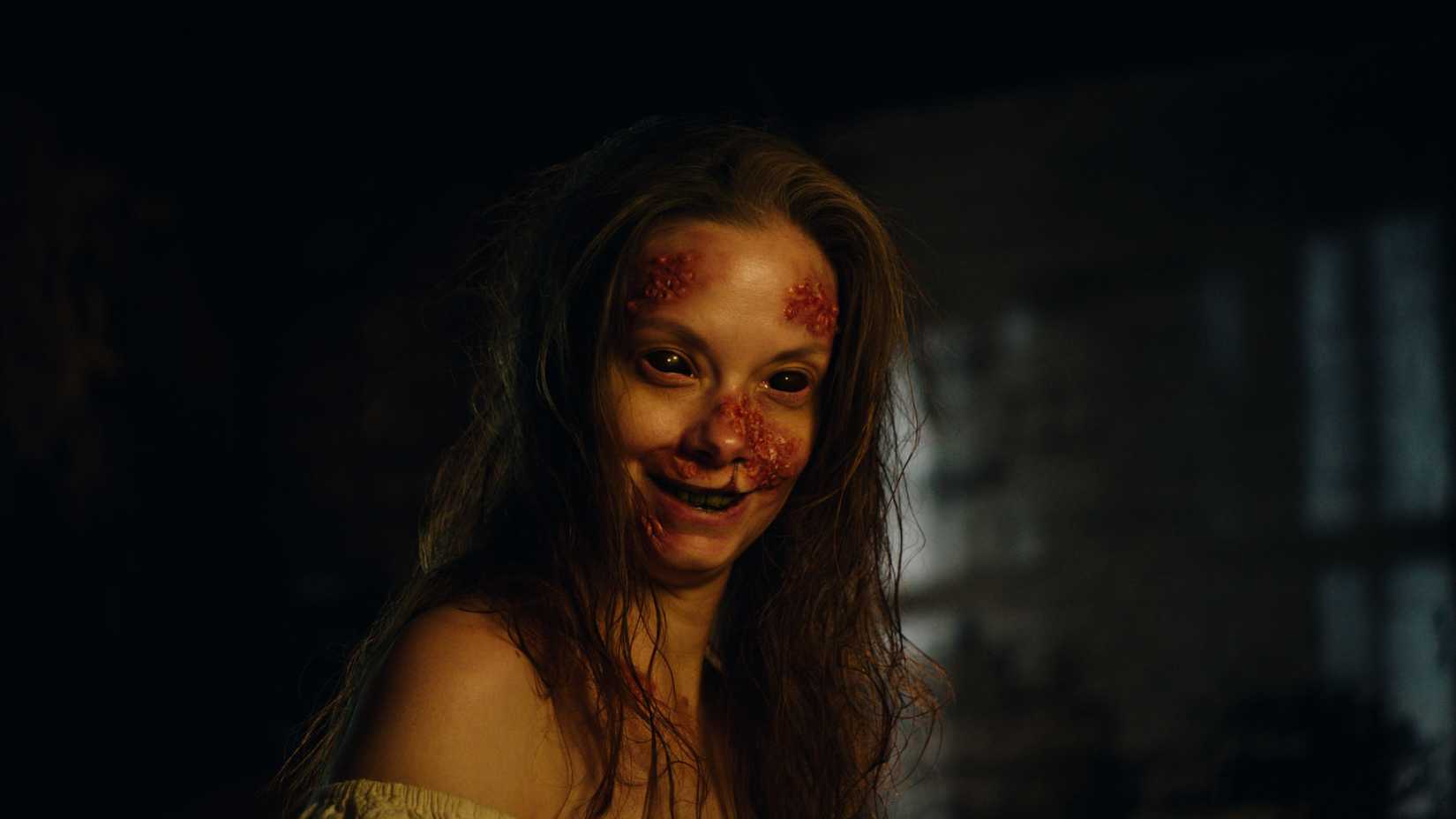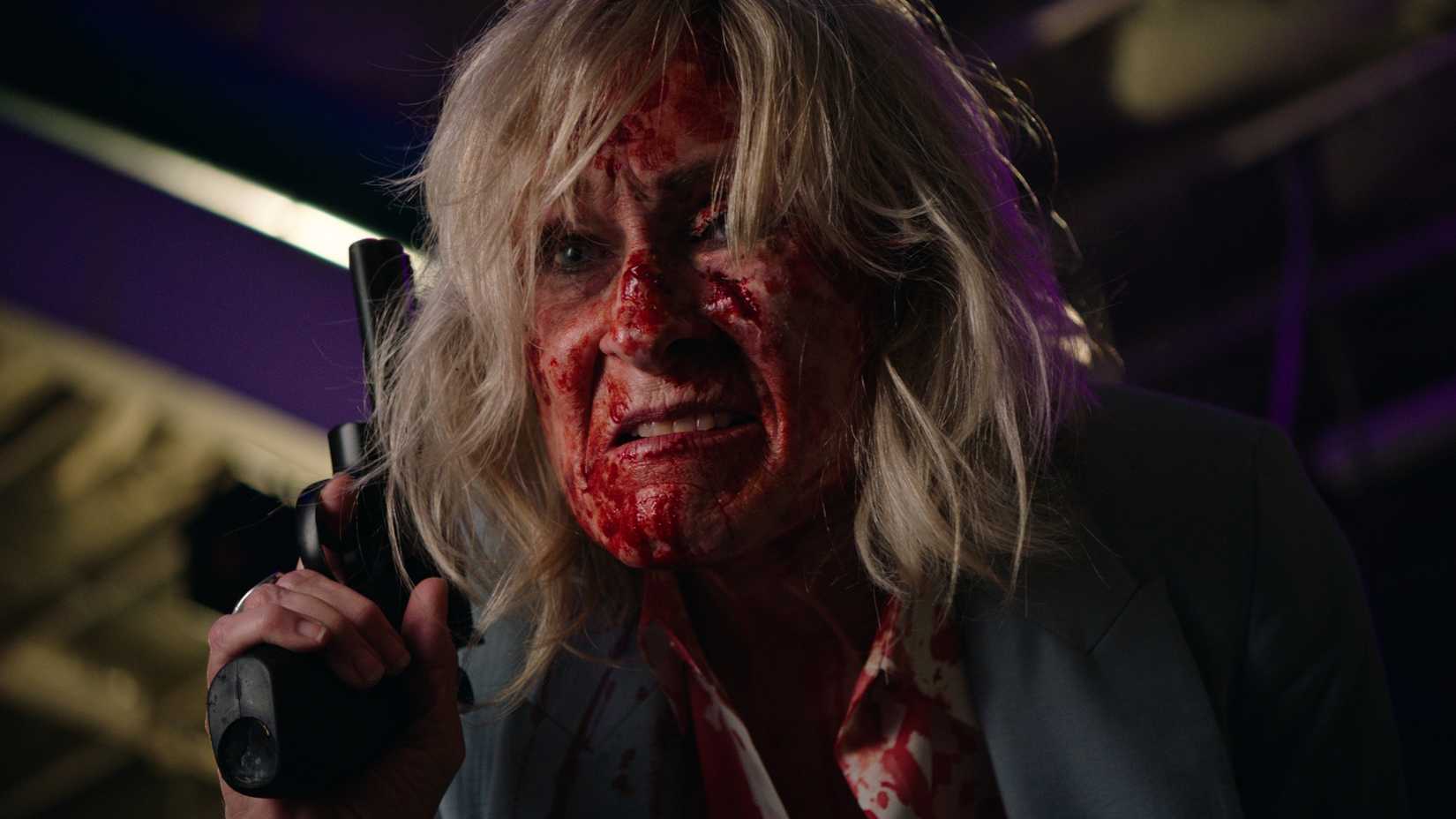When a film begins by presenting a fact that any know-it-all psychology major could recite unprompted, it’s only natural to continue the viewing experience with an air of skepticism. And when said fact concerns something as touchy as childhood trauma, that air of skepticism is injected with trepidation. In the case of Pierre Tsigaridis’ horror film Traumatika, the opening frame lists the five forms of childhood trauma, defined by psychology: “physical neglect, witnessing violence, emotional, physical, and sexual abuse.”
It’s a jarring, if not borderline-tacky, start to a possession-slasher flick featuring a Nosferatu-like demon who acts as the physical manifestation of trauma. Jokes aside, writer-director Tsigaridis and co-writer Maxime Rançon set out to make a film that seemingly (and controversially) favors nurture to nature. In an accompanying director’s statement, Tsigaridis’ says that “the idea behind the film was to portray childhood trauma as a possible origin of evil.” Posing core existential questions like, “Are people born evil, or are they made evil?” Tsigaridis also notes that “it is undeniable that childhood trauma plays a significant role in shaping adult criminals.”
Traumatika
- Release Date
-
August 24, 2024
- Runtime
-
88 minutes
- Director
-
Pierre Tsigaridis
- Producers
-
Maxime Rancon
Cast
These questions and theories are abstractly explored in Traumatika after a child-predator demon called Volpaazu (Rançon) is released from an Egyptian artifact no person in Pasadena, Calif., has any business handling. The beast possesses the film’s adult characters, guiding them toward impressionable children in hopes of finding the chosen one, whatever that means. The tactics of Volpaazu, a.k.a. the “taker of children,” involve manipulation, coercion, isolation and blame, all of which are strategies used in real-life child abuse and exploitation cases. Traumatika‘s sincere efforts to showcase characters battling all sorts of demons — both literally and figuratively — are clear, as is its reverence for the use of metaphor, but both execution and moral messaging vary.
An Egyptian Demon and a Serial Killer With PTSD
The audience is first introduced to a man named Jaffar (Brahim Rachiki) as he traverses the sands of Egypt’s Sinai Peninsula in 1910. He’s evidently possessed by a demon that has been freed from a small chimera artifact (featuring an avian head and a mysterious mammal body), stabbing himself in the chest before mumbling the words “creator of evil, creator of chaos.” A cursed artifact from the Middle East being mishandled by ignorant white Americans is a tired, arguably offensive trope that the horror genre needs to retire. (The Exorcist did it in 1973, and that should have been the last time.)
In Traumatika‘s modern-day setting, an alcoholic father of two daughters in the midst of an ugly, not to mention expensive, divorce gets his hands on the artifact in 2003, hoping to turn a profit. It’s not mentioned how John Reed (Sean O’Bryan in an overacted performance) acquired the object, but his superstitious business partner of sorts, Steve (Sean Whalen), warns him that the internet discourages removing the figurine’s head, as that would open a portal for Volpaazu. John says he “doesn’t believe in this pagan bulls****,” and that it’s “just a stupid artifact from Africa or something.” Of course, John removes the head, letting the demon out like a genie from a lamp.
It isn’t long before Volpaazu possesses his body and sexually assaults the eldest daughter, Abigail — played by 41-year-old Rebekah Kennedy, who feels a bit too mature for the role considering the aforementioned custody battle. When Abigail learns she’s been impregnated by her father with Volpaazu’s offspring, she performs a brutal abortion on herself with a conveniently placed wire hanger. The demon is furious that she’s terminated the pregnancy and “betrayed” him, as she was selected to be his handmaid. If Abigail doesn’t find a little boy to replace her unborn child, Volpaazu threatens to impregnate her much younger sister, Alice (Paxton Carville). A tormented Abigail — who seemingly comes in and out of a state of demonic possession — hunts for little boys until she finds “the chosen one,” Mikey (Ranen Navata), on her fourth attempt.
Abducted from his front lawn, Mikey is terrorized and abused by Abigail and Volpaazu, forced to live among the corpses of the three other boys. The film explores the childhood trauma of Mikey, Alice and Abigail (once again, Abigail’s age is a huge question mark) across three timelines. The contentious opening sequence in Egypt can be considered Traumatika‘s fourth timeline.
A Third Act With Entirely Too Much Plot
Questionably, Traumatika presents the audience with two monsters (take this label with a grain of salt): a dark supernatural entity that preys on children, and Mikey (Luke Bucaro as adult Mikey), a victim of Volpaazu’s abuse who grows up to become a traumatized serial killer. (Abigail’s identity as a child-napping “monster” is up for debate.)
Much of the dialogue is cringe-inducing (e.g., a police officer yelling down the stairs to a demonic Abigail, “Ma’am, are you trying to scare me? … I will f***ing smoke you!”), but a particular line from Steve stands out: “Volpaazu preys on children to abuse them, to sacrifice them or turn them into demons,” he tells John over the phone, citing an online article from CreepyNews.com, “and then they say it spreads like a disease.” The messaging here is moot, but the line can be attributed to a hypothetical chain reaction that’s only solidified later on.
Set in 2024, the convoluted third act throws grown-up author and activist Alice (Emily Goss) into an episode of a 60 Minutes-like show, spewing statistics about childhood trauma. “Research shows that around 60% of the general population has had at least one adverse childhood experience,” Alice explains. “However, that number goes up to 97% among the criminal population. Therefore, I believe that children who were traumatized in youth deserve extra care and support when they become adults.” The abused becoming the abuser and cycles of violence and reactionary abuse are all really weighty topics that the 81-minute Traumatika is just not cut out to dissect.
The film seemingly sympathizes with the infantile adult Mikey, whose third-act murderous rampage feels more in line with a satirical Scream franchise film than with an allegorical supernatural one. Via unethical television journalist Jennifer Novac (Susan Gayle Watts, whose performance is a campy delight), the third act offers commentary on America’s exploitative tendency to capitalize on crime and society’s near-fetishistic obsession with true crime content. There’s just a lot going on — tonally, thematically and narratively — and Traumatika drowns in its own convoluted ideas.
Sure, there are some spooky scenes, including a static shot of Abigail walking out of a kitchen, stale-yellow lighting adding to the disorienting sight of a demon crawling on the ceiling of a distant hallway (reminiscent of a particularly terrifying scene fromThe Exorcist III). Additionally, the use of mind-numbing, uncanny cartoons creates a bizarrely meditative atmosphere, as if the children are self-soothing in the midst of traumatic chaos. The positive aspects unfortunately don’t make up for Traumatika’s jumbling of subgenres, hackneyed horror tropes and trite dialogue, which ultimately dilute what could have been poignant takeaways about the lasting impacts of childhood trauma and the monsters that create it.
From Saban Films, Traumatika hits theaters on September 12, 2025.
This story originally appeared on Movieweb




